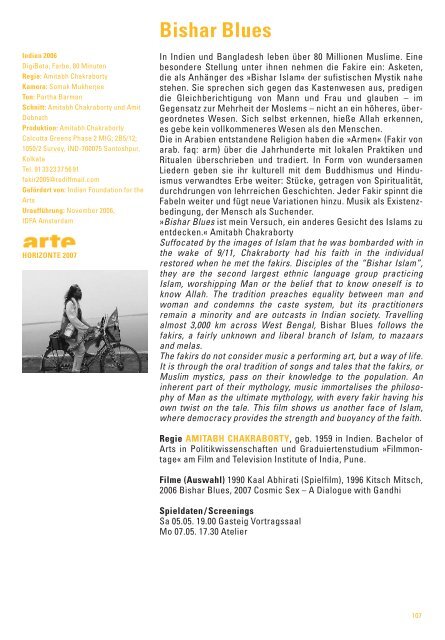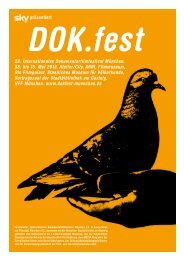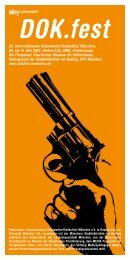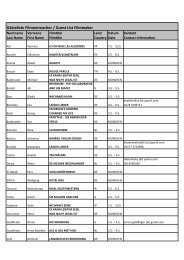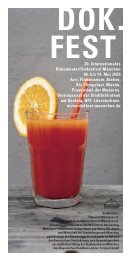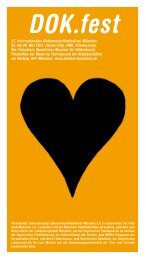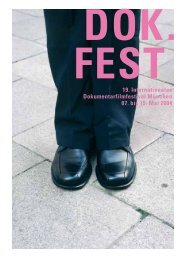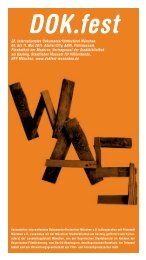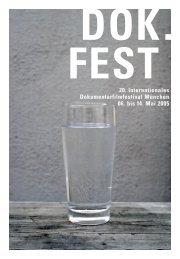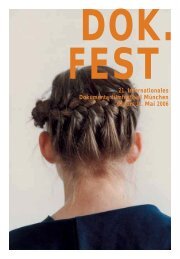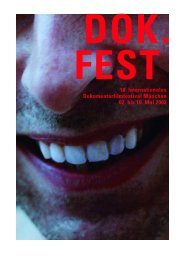22. Internationales Dokumentarfilmfestival München 02. bis 10. Mai ...
22. Internationales Dokumentarfilmfestival München 02. bis 10. Mai ...
22. Internationales Dokumentarfilmfestival München 02. bis 10. Mai ...
Erfolgreiche ePaper selbst erstellen
Machen Sie aus Ihren PDF Publikationen ein blätterbares Flipbook mit unserer einzigartigen Google optimierten e-Paper Software.
Indien 2006<br />
DigiBeta, Farbe, 80 Minuten<br />
Regie: Amitabh Chakraborty<br />
Kamera: Somak Mukherjee<br />
Ton: Partha Barman<br />
Schnitt: Amitabh Chakraborty und Amit<br />
Debnath<br />
Produktion: Amitabh Chakraborty<br />
Calcutta Greens Phase 2 MIG; 2B5/12;<br />
1050/2 Survey, IND-700075 Santoshpur,<br />
Kolkata<br />
Tel. 91 33 23 37 56 91<br />
fakir2005@rediffmail.com<br />
Gefördert von: Indian Foundation for the<br />
Arts<br />
Uraufführung: November 2006,<br />
IDFA Amsterdam<br />
HORIZONTE 2007<br />
Bishar Blues<br />
In Indien und Bangladesh leben über 80 Millionen Muslime. Eine<br />
besondere Stellung unter ihnen nehmen die Fakire ein: Asketen,<br />
die als Anhänger des »Bishar Islam« der sufistischen Mystik nahe<br />
stehen. Sie sprechen sich gegen das Kastenwesen aus, predigen<br />
die Gleichberichtigung von Mann und Frau und glauben – im<br />
Gegensatz zur Mehrheit der Moslems – nicht an ein höheres, übergeordnetes<br />
Wesen. Sich selbst erkennen, hieße Allah erkennen,<br />
es gebe kein vollkommeneres Wesen als den Menschen.<br />
Die in Arabien entstandene Religion haben die »Armen« (Fakir von<br />
arab. faq: arm) über die Jahrhunderte mit lokalen Praktiken und<br />
Ritualen überschrieben und tradiert. In Form von wundersamen<br />
Liedern geben sie ihr kulturell mit dem Buddhismus und Hinduismus<br />
verwandtes Erbe weiter: Stücke, getragen von Spiritualität,<br />
durchdrungen von lehrreichen Geschichten. Jeder Fakir spinnt die<br />
Fabeln weiter und fügt neue Variationen hinzu. Musik als Existenzbedingung,<br />
der Mensch als Suchender.<br />
»Bishar Blues ist mein Versuch, ein anderes Gesicht des Islams zu<br />
entdecken.« Amitabh Chakraborty<br />
Suffocated by the images of Islam that he was bombarded with in<br />
the wake of 9/11, Chakraborty had his faith in the individual<br />
restored when he met the fakirs. Disciples of the “Bishar Islam”,<br />
they are the second largest ethnic language group practicing<br />
Islam, worshipping Man or the belief that to know oneself is to<br />
know Allah. The tradition preaches equality between man and<br />
woman and condemns the caste system, but its practitioners<br />
remain a minority and are outcasts in Indian society. Travelling<br />
almost 3,000 km across West Bengal, Bishar Blues follows the<br />
fakirs, a fairly unknown and liberal branch of Islam, to mazaars<br />
and melas.<br />
The fakirs do not consider music a performing art, but a way of life.<br />
It is through the oral tradition of songs and tales that the fakirs, or<br />
Muslim mystics, pass on their knowledge to the population. An<br />
inherent part of their mythology, music immortalises the philosophy<br />
of Man as the ultimate mythology, with every fakir having his<br />
own twist on the tale. This film shows us another face of Islam,<br />
where democracy provides the strength and buoyancy of the faith.<br />
Regie AMITABH CHAKRABORTY, geb. 1959 in Indien. Bachelor of<br />
Arts in Politikwissenschaften und Graduiertenstudium »Filmmontage«<br />
am Film and Television Institute of India, Pune.<br />
Filme (Auswahl) 1990 Kaal Abhirati (Spielfilm), 1996 Kitsch Mitsch,<br />
2006 Bishar Blues, 2007 Cosmic Sex – A Dialogue with Gandhi<br />
Spieldaten / Screenings<br />
Sa 05.05. 19.00 Gasteig Vortragssaal<br />
Mo 07.05. 17.30 Atelier<br />
107


